Animal Radio® Network Newsletter
|
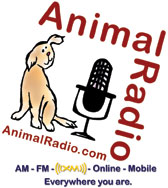
|
- Study says: Cat People More Neurotic - Dog People Outgoing
- Animal Control Officer Fired For Shooting 100+ Dogs
- Emmylou Harris, Aid for Haitian Pets, Cancer Vaccine and more...on-air now at Animal Radio®
- Second Hand Smoke Harms Your Pets - Fatality Rate Greatly Increased
- Every Dog Used To Get One "Free" Bite - Amy Feldman on Pet Liabilities
- The HAPPY Act ...Not So Happy. $3,500 Tax Deduction Getting Mixed Response
- Your Furry Valentine
- What is a "Hot Spot?"
- Ask the Animal Radio® Dream Team: Mange, Allergies and Breaking the Treat Habit
|
Study says: Cat People More Neurotic - Dog People Outgoing Posted: 07 Feb 2010 02:44 PM PST
Sam Gosling, professor of Psychology at the University of Texas in Austin, is publishing his findings in the journal Anthrozoös saying it is the first study to break down what cat and dog people tend to be like. Gosling says his study involving over 4500 participants shows dog people and cat people have distinct differences. According to the findings dog people are more outgoing, easygoing and conscientious, cat people on the other hand tend to be neurotic. But on the up side, cat people are more open than their dog loving counterparts. Gosling said, "This research suggests there are significant differences on major personality traits between dog people and cat people." Gosling with the help of grad student Carson Sandy asked 4,565 volunteers 44 questions and ranked them according to the "Big Five" personality dimensions used by psychologists to study personalities. Forty six percent said they were dog people with just 12 percent claiming to be cat lovers. About 28% of those surveyed said they liked both dogs and cats while just 15% didn't like either pet. When Animal Radio® host Judy Francis asked actress Betty White if she was a 'Cat Person' or 'Dog Person,' she replied "I'm an anything with four-legs person." Listen to Betty White on Animal Radio® This posting includes an audio/video/photo media file: Download Now |
|
Animal Control Officer Fired For Shooting 100+ Dogs Posted: 07 Feb 2010 02:44 PM PST
Further investigation indicates this isn't the first brush with the law for Esco. The story, first reported by radio station owner Jerry Lousteau, told of a local animal control officer fired. In a small town, while this is normally news, the undercurrent of why he was fired and the circumstances surrounding it, became the real story. In this case, Animal Control Officer Alonzo Esco was accused of shooting over 200 dogs, then discarding their carcasses in different rural areas. Nepotism in government agencies is abundant, and in this case, Esco was the cousin of the previous mayor. During the mayors six years in office, he assigned Esco to two different city departments. After the revelation that Esco was stealing gas from the fire department, instead of getting rid him, they 'demoted' him, making him an animal control officer, "perhaps thinking that he wouldn't cause any more trouble," says Lousteau. A new mayor was appointed in July of 2009. The investigation conducted by the Canton Police Report states that Esco killed over 200 dogs. But, Lousteau says, "It's more like 100." Esco was also an auxiliary policeman, which allowed him to carry a weapon. This is the weapon he reportedly used to shoot the dogs. It is reported that Esco shot the dogs and then disposed of them in rural areas outside of town over some time, with one body actually being dumped within the city limits. The others bodies have been spread out in many different areas. Some of the bodies of these dogs are still being discovered today. There is a large stray population of animals in Canton according to Lousteau. "It is thought that Alonzo was under extreme pressure to deal with it. However, he went way outside the policy on how to deal with them. There was actually a mechanism in place to properly handle the situation, but that meant he had to drive to an animal shelter about an hour away." Alonzo Esco has since been fired for 'improperly disposing of dogs.' The case is being handled by the Madison County District Attorney's office, and is being treated as a misdemeanor. There are two petitions to encourage the state of Mississippi to enact a felony penalty for animal cruelty. Mississippi is currently one of a few remaining states where animal cruelty is just a misdemeanor. To sign the petitions, please visit http://www.wmgoradio.com. Reader Comments About This Story: I have been fighting Hitler's law BSL for many years,and this is one of the major problems that
I am officially now ashamed to be from the town of CANTON MS. Since I am now finding out that there are no felony laws against animal torture. (these next words stick in my throat)…I am ASHAMED to be a Mississippian... I am torn between tears and shaking rage. When will we as a society stand up and speak for those who can't speak and say "this is not acceptable" and we will not tolerate it any longer. God has those gentle little creatures now in his arms and has prepared a special place in hell for this man... To hear that the mayor of Canton is the cousin of Mr. Esco only demonstrates that the nut doesn't fall far from the tree.The mayor had to be sheltering him all along for his theft of city gas, bringing drugs into city jails, the massacre of animals with illegal dumping into the waterways and the rumored connection to providing dogs and cats as bait for the fighting dogs...
This posting includes an audio/video/photo media file: Download Now |
|
Emmylou Harris, Aid for Haitian Pets, Cancer Vaccine and more...on-air now at Animal Radio® Posted: 07 Feb 2010 02:44 PM PST Right now on Animal Radio: Guiding Eyes for the Blind is looking for people who want to become part of something bigger than themselves. The renowned nonprofit guide dog school is actively recruiting puppy raisers – volunteers that take 8 week old puppies into their homes, love, nurture, and educate them and send them off to their calling as a guide dog for a blind or visually impaired man or woman. Listen
After Holiday "Returns" Include Animals. The after holidays "returns" are continuing, and sadly that include the adorable puppies, kittens and potbelly piglets given as gifts. The Humane Society of New York reports many of those pets are being dropped off at shelters. They expect more uninformed gift decisions to result in another big drop off just after Valentines Day. Listen
Cancer Vaccine for Dogs
This posting includes an audio/video/photo media file: Download Now |
|
Second Hand Smoke Harms Your Pets - Fatality Rate Greatly Increased Posted: 07 Feb 2010 02:44 PM PST
Most people are aware of the scientific research that shows that people who smoke are more likely to get certain types of cancer and other diseases, but a lot of people don't know that the same goes for the pets of smokers. Lung cancer and nasal cancer are particularly threatening to dogs while cats that live with smokers are twice as likely to develop malignant lymphoma—fatal to three out of four cats within a year—and are more likely to get mouth cancer. Dogs with short noses have double the risk of lung cancer and long-nosed dogs such as collies have two and half times greater risk of nasal cancer from secondhand smoke. Listen to Dr. Kim May on Animal Radio® This posting includes an audio/video/photo media file: Download Now |
|
Every Dog Used To Get One "Free" Bite - Amy Feldman on Pet Liabilities Posted: 07 Feb 2010 02:44 PM PST Amy Epstein Feldman, nationally syndicated legal commentator and author of the newly released book, "So Sue Me, Jackass," states that an estimated 63 percent of U.S. households have a pet according to some studies. And while we enjoy their companionship and unconditional love, we often overlook that there are legal ramifications to owning a furry friend.
It used to be that every dog got one "free" bite. This meant that if you had no idea that your dog had any propensity to do violence or damage, you were let off the hook. But now, you are held liable if your dog does damage to someone else, whether or not you knew your dog had that tendency. For the longest time, pets have been considered property, but fortunately that is evolving. There is currently a case in a Vermont court where someone visiting friends with their dog and the dog got out. The dog then went onto a neighbor's property, who then shot the dog. The neighbor said he didn't mean any harm; it was just an air pellet gun. But the dog turned around, and was shot in the chest. That neighbor plead guilty to a misdemeanor charge, did 100 hours of community service and paid $4,000 in compensatory damages to the owners. The owners didn't feel this was enough, so they sued the neighbor. Hopefully the decision of this case will change the way the courts view the value of a pet. Listen to Amy Feldman on Animal Radio® This posting includes an audio/video/photo media file: Download Now |
|
The HAPPY Act ...Not So Happy. $3,500 Tax Deduction Getting Mixed Response Posted: 07 Feb 2010 02:45 PM PST
We asked Animal Radio® listeners what they thought about the HAPPY ACT, and here's how they responded: Hi all, I have mixed feelings about the pet tax credit. We have a very precious toy poodle that we would love to get a credit for but we have a fear about it as well. That being that people would get a pet just to get the credit and either abuse or completely neglect the pet and create an even bigger problem. Just watch any of the animal cops shows on animal planet and I think you will see my point. It really disgusts me to see what people do to pets. I love it. If you're going to have a pet and it's not part of the family, you shouldn't have it. We have 20 and I pick up strays all across the country and I bring them home. But to me, even if it is $3,500, that's more money I can spend on saving another one; getting spays or neuters done for somebody else who can't afford it. My pets come first in my family. If we have to, we do without to make sure they get what they need. I'm all for the HAPPY Act! Hear Listener Response on AnimalRadio® This posting includes an audio/video/photo media file: Download Now |
|
Posted: 07 Feb 2010 02:45 PM PST (By Ruth MacPete, DVM) Our pets give us so much and ask for so little. Show them how much you love and appreciate them this Valentine's Day by giving them the ultimate gift of love: good health. * Why wait until your pet is sick before seeing the veterinarian? Instead, take your pet to the veterinarian for a routine check–up at least once a year. Routine check-ups allow your veterinarian to detect medical issues early when they are easiest to treat and help keep your pet in top shape.
So remember when you are thinking about your loved ones this Valentine's Day don't forget about your four legged friends. Our furry friends give us unconditional love and companionship year round and deserve a show of affection.
|
|
Posted: 07 Feb 2010 02:45 PM PST
Hot spots are a symptom of toxicity. As the body attempts to remove these impurities, they show up as skin lesions. If we try to treat the symptom with drugs that suppress them we end up with two problems. One, drugs themselves can suppress the expression of disease and therefore the ability to heal. Much like the analogy of seeing your car's oil light come on. Spray painting over the light does not make the problem go away. You know that, in time, the internal workings of your engine will be damaged; you just won't have seen the signals to remind you. Two, when the drugs are stopped the symptoms will return and drugs like corticosteroids, contribute to overall chemical damage. Now the body has to clear these drugs from the system too. Symptoms mean something is wrong. We need to fix the problem. Fewer toxins in the body mean less stress on the elimination systems like the liver, kidney and skin. If your dog has skin irritations, dry patchy skin or hot spots, do something about it now. Examine potential sources of toxicity. Chemical toxicity is one of the major factors in blocking the body's ability to heal. Look at your dog's diet. Your dog needs pure, healthy, natural dog foods. You try to eat healthy, unprocessed foods. Why shouldn't your best friend? Dr. Janice Elenbaas DC has had a long and successful career as a Chiropractor to both humans and animals. As the first woman recognized to adjust animals in Canada and a founding member of the first Ontario Veterinarian Chiropractic Association she is passionate about our animals' health. With four years of Nutritional Studies coupled with a natural approach to health care and a lifelong love of animals it was only natural that Dr. Elenbaas founded Lucky Dog Cuisine Inc. A company dedicated to providing All American, all natural, "Human Grade", cooked meals for dogs. For more information or to contact Dr. Elenbaas please go to www.luckydogcuisine.com. |
|
Ask the Animal Radio® Dream Team: Mange, Allergies and Breaking the Treat Habit Posted: 07 Feb 2010 02:45 PM PST
Red Mange or Allergies? Sherry: I have a 12 month old female parti (mostly white) female Boxer. She is in her first "real heat" and has developed a red rash with hair loss also. The rash was diagnosed as red mange and dips prescribed. I am against the dips as they are toxic and from my understanding this type of mange is an immune disorder. My vet is not a Fan of holistic treatment. It is also worth mentioning that the rash seems to worsen when she is goes out into our backyard. She loves to rut in the bushes and we live in SC where poison oak and sumac thrive. Have restricted her to lease walks and rash looks less red with out new pimple outbreaks. Lost as to what to do next and hoping you can provide help. Would hate to put her through dips if it is not mange (negative skins scraps) and environmental/immune disorder. Thanks so much! Doctor Debbie: One important point to clarify regarding your Boxer....is there just a single mange location (localized demodex) or many areas (generalized demodex)?? A localized case of demodectic mites does not warrant full body dipping, but a generalized one does. I too share your concern with use of pesticides if not needed. However, if your dog has generalized mange then I definitely advise starting treatment for the mites. You are correct that some pet's immune system is better able to fight off demodex mites, but it is a parasitic disease not an environmental one. My absolute MUST TREAT situations include when a dog has generalized demodex, secondary bacterial infections, or excessive hair loss. I do not advocate holistic therapies in these situations .....I would reserve holistic therapies for the pet with a single localized demodex area.
1. Amitraz dips or oral ivermectin therapy. Ask your vet about the oral ivermectin alternative if you're not keen on the dips. Some docs feel this is now one of the best ways to treat the disease. 2. Spay her and do not breed her. This is because Generalized mites are a heritable problem and not desired to be passed to pups. And the hormones of the heat cycle will make it harder for her to recover from the mites! And certainly before any treatment is started, I'd want to make sure the mites have actually been diagnosed with a test called a skin scraping. If your vet hasn't done this for you STOP and REQUEST this test!
Valerie: I rescued a 3 year old black lab (Kiah) from the Madera, CA Animal Shelter 5 years ago. She came to me as a very timid lab - prone to destroying things when left alone and also with a terrible fear of men. We have worked through these problems, and with a lot of love and patience she has grown to be a very secure dog and an integral part of my life. Here's the problem, and I'd have to say that I am to blame for the situation. Throughout her first months at my home, Kiah wouldn't want to eat or play and only seemed happy when I would give her treats. Now 5 years later, I find that her diet is consisting mostly of treats. I suppose it was a gradual transition through the years of when she ignored her food I would give her some treats, progressing to now someday she will not eat any dog food - so since I can't handle the thought of her not eating, I give hear treats. As I'm gone for 9-10 hours most every day I find myself leaving enough treats to get her through that time ...I suppose it's my own guilt about leaving her alone for that period of time. Any advice on how I can correct the situation? I can't imagine just leaving her for a large portion of the day with only a bowl of food. An interesting footnote is that when I take her visiting to family members or friends homes, I take her food and bowl along and she will always finish the bowl of food. This very same bowl with the same food will usually sit untouched at home even when I am home with her in the evenings. One more questions, is it harmful to the dogs well being to leave her alone for such a long period of time every day? Doctor Debbie: Hi Valerie! I have to jump in....your sweet lab has taken advantage of your concern for her appetite and well-being. Treats should never account for more than 10% of a dogs total food calorie intake. An all treat diet is simply not healthy for her. She is dictating the feeding program in the house and it is going to be to her detriment. Does a 5 year old child know what foods are good for them? No, they would eat candy and ice cream if we allow it. So Valerie.... It's time for TOUGH LOVE!
I have labradors and know how hard it can be to look in those brown eyes and stand firm. Once you accept that the current feeding pattern is unhealthy and cannot continue- you will find the strength. You can do it! Listen to Dr. Debbie on Animal Radio®
This posting includes an audio/video/photo media file: Download Now |
| You are subscribed to email updates from Animal Radio® Monthly Newsletter
To stop receiving these emails, you may unsubscribe now. |
Email delivery powered by Google |
| Google Inc., 20 West Kinzie, Chicago IL USA 60610 | |

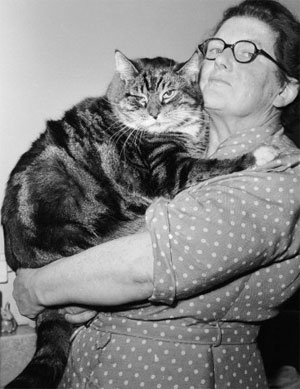 (By Animal Radio® News Director Bobbie Hill) The early Egyptians loved cats and elevated the most popular house pet to the level of god. But does this type of affinity for felines mean they were neurotic? It does if you believe a study by a leading authority on human personality.
(By Animal Radio® News Director Bobbie Hill) The early Egyptians loved cats and elevated the most popular house pet to the level of god. But does this type of affinity for felines mean they were neurotic? It does if you believe a study by a leading authority on human personality.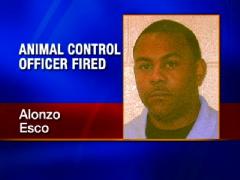 (Jerry Lousteau, WMGO 1370A, Canton, Mississippi) In recent news, it was reported that a Canton, Mississippi Animal Control Officer, Alonzo Esco, was shooting dogs to reduce the population in the overcrowded shelter. Now, more carcass dumps are being discovered throughout Canton.
(Jerry Lousteau, WMGO 1370A, Canton, Mississippi) In recent news, it was reported that a Canton, Mississippi Animal Control Officer, Alonzo Esco, was shooting dogs to reduce the population in the overcrowded shelter. Now, more carcass dumps are being discovered throughout Canton.
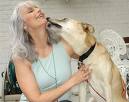
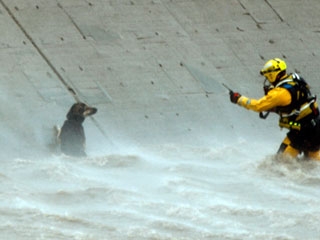 Firefighter Makes Heroic Dog Rescue
Firefighter Makes Heroic Dog Rescue
 Aid for Haiti's Pets and Animals
Aid for Haiti's Pets and Animals

 (Dr. Kim May, AVMA) Dr. Kim May is the Assistant Director of Professional and Public Affairs for the American Veterinary Medical Association (AVMA). Dr. May is letting smokers know there is another good reason to quit smoking—the health of their pets.
(Dr. Kim May, AVMA) Dr. Kim May is the Assistant Director of Professional and Public Affairs for the American Veterinary Medical Association (AVMA). Dr. May is letting smokers know there is another good reason to quit smoking—the health of their pets.
 If you're a pet owner, the HAPPY ACT just might bring you a tax deduction! HAPPY is an acronym for The Humanity and Pets Partnered Through the Years Act. Also known as House of Representatives Bill 3501. The Happy Act was introduced by Representative Thaddeus McCotter, a Republican from Michigan. Should the HAPPY Act pass in its present form, it would allow pet owners to deducted the cost of food, veterinary care, and other pet related expenses from their income taxes – up to $3,500 per year.
If you're a pet owner, the HAPPY ACT just might bring you a tax deduction! HAPPY is an acronym for The Humanity and Pets Partnered Through the Years Act. Also known as House of Representatives Bill 3501. The Happy Act was introduced by Representative Thaddeus McCotter, a Republican from Michigan. Should the HAPPY Act pass in its present form, it would allow pet owners to deducted the cost of food, veterinary care, and other pet related expenses from their income taxes – up to $3,500 per year.
 (Dr. Janice Elenbaas) The skin, kidneys and liver are the major organs in the body that are responsible for eliminating toxins and impurities. The skin is the largest of these organ systems. What is the simplest way to help your dog stay healthy and avoid skin irritations and hot spots? Feeding healthy, natural dog food provides less stress on the body and fewer toxins.
(Dr. Janice Elenbaas) The skin, kidneys and liver are the major organs in the body that are responsible for eliminating toxins and impurities. The skin is the largest of these organ systems. What is the simplest way to help your dog stay healthy and avoid skin irritations and hot spots? Feeding healthy, natural dog food provides less stress on the body and fewer toxins.

